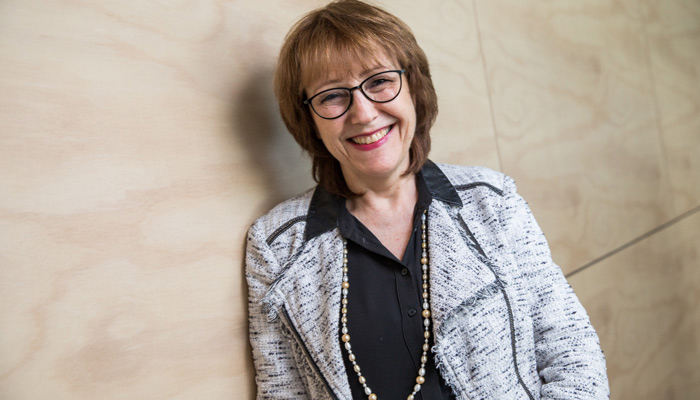Professor Lucy Taksa has spent her working life being an informed voice for change. She has worked with, numerous universities, various NSW Government bodies and not-for-profit organisations and today is a Professor of Management at Deakin University’s Business School in the Faculty of Business and Law, after having been a Head of Department, Associate Dean, and Research Centre Director at the University of NSW and Macquarie University. Besides these leadership roles, she also chaired the Board of the NSW State Archives and Records and was a non-Executive Board member of Settlement Services International Ltd. To date, her research has focused on the organisation of work, equity and diversity management, migrant employment and entrepreneurship, representations of women leaders and heritage management.
Lucy arrived in Australia as a child with her parents so understands many of the challenges facing migrants. Throughout her education, she was lucky to be supported by some amazing women role models who promoted economic and educational aspirations for young women. Their encouragement played an important role in supporting her to become the first in her family to attend university. “They taught me the value of advocacy and thought leadership and in turn, I have worked to emulate these mentors,” says Lucy.
Her appointment as a member of the NSW Equal Opportunity Tribunal (later part of the Administrative Decisions Tribunal) gave her first-hand exposure to many cases of discrimination. These varied from sexual harassment and race discrimination to disability discrimination and increased her understanding of the complexity and inequity that many women face in our society. This motivated her to take action to promote equitable outcomes for women in every organisation she has worked for. She developed and taught a course on Managing Equity, Diversity and Disability at UNSW and included diversity issues in all the industrial relations, human resource management and organisational behaviour courses she taught.
At the University of NSW, she was proud to chair and administer the Vice Chancellor’s Childcare Assistance Fund for Women Researchers. This fund made it easier for women academics to maintain their national and international research profiles after having children. It supported their career aspirations by enabling them to travel to conferences. The exposure of their research had a hugely positive impact on their career and faster progression.
Still at the University of NSW, she was a member of the Gender Equity Strategy Committee and played a pivotal role in the introduction of a mid-career women’s mentoring scheme at the Australian School of Business. The mentoring helped women navigate the system and gave them the confidence and social capital needed to progress their careers.
At Macquarie University, she introduced the NSW Government’s Lucy Mentoring Program to the Faculty of Business and Economics. This enables young women to learn from government and industry leaders. “Lucy” is an innovative leadership program with a primary focus on women in university studying business, finance, economics, accounting, and law. Lucy explains, “It is not named after me, but it does an amazing job of providing opportunities by widening their network and connecting them to possible jobs.”
“If we have a voice, we must exercise it.”
Lucy does not mind being controversial. In her role as MC for the NSW CEDA Women’s Leadership program some years ago, she sought to challenge some of the norms relating to gender and age. She believes this is important, especially in public forums. A great example of this was when she opened events with a “Welcome everyone” greeting, deliberately dropping the reference to ladies and gentlemen. Something simple that was appreciated by many of those attending. In another example, she questioned the phrase “bringing your whole self to work”. She believes that for some people there are important aspects of their lives they would be happier leaving in the privacy of their homes. Ultimately, she can see a need to continue to challenge the norms that support male stereotypes and masculine behaviour in the workplace, and she hopes to see some new inclusive norms being created.
Much of her recent focus has been on ‘diversity washing’, a term that describes when organisations market and brand their support for diversity but on deeper inspection do not embed inclusion into their processes or accountability for ensuring it is practised. In an OECD survey of 432 human resource managers conducted with the AHRI (Australian Human Resources Institute (AHRI) in 2018-19many respondents commented on the need for leaders not to just to talk the talk but also to walk the walk.
Today, she can see changes happening within academia as more women are being employed in leadership roles. In the past, women were expected to fill highly feminised roles. Now it is important for women in leadership roles not to be seen solely as ‘mothers’ who can fix operational problems, care for others and mediate between staff and students. Women leaders can make important contributions to strategy, she argues. Deakin University is progressive in this regard. She continues to play an active role in collaborating with scholars from around the world to expose the history and importance of women in a variety of leadership roles and women’s corporate networks. She has become a role model and mentor to many women across the organisation.
When asked what drives her, she mentions her migrant background and the importance of her family placed on dreaming of a better world in Australia far from the war-torn Eastern Europe they grew up in. She believes no single person can change things alone. It takes a community. However, those with the knowledge, commitment and capacity should be the change makers. Lucy says, “If we have a voice, we must exercise it.”

